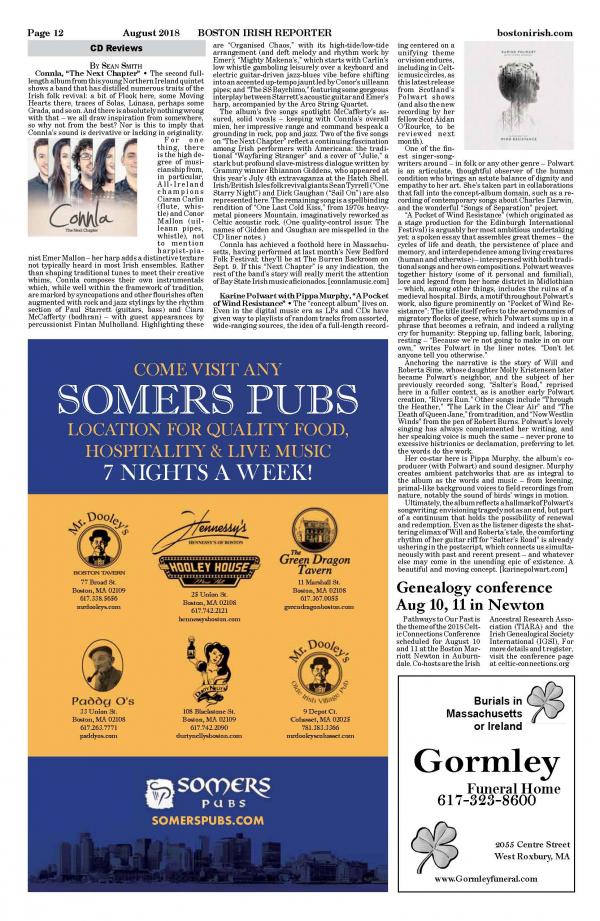July 31, 2018

Connla, “The Next Chapter” • The second full-length album from this young Northern Ireland quintet shows a band that has distilled numerous traits of the Irish folk revival: a bit of Flook here, some Moving Hearts there, traces of Solas, Lúnasa, perhaps some Grada, and so on. And there is absolutely nothing wrong with that – we all draw inspiration from somewhere, so why not from the best? Nor is this to imply that Connla’s sound is derivative or lacking in originality.
For one thing, there is the high degree of musicianship from, in particular, All-Ireland champions Ciaran Carlin (flute, whistle) and Conor Mallon (uilleann pipes, whistle), not to mention harpist-pianist Emer Mallon – her harp adds a distinctive texture not typically heard in most Irish ensembles. Rather than shaping traditional tunes to meet their creative whims, Connla composes their own instrumentals which, while well within the framework of tradition, are marked by syncopations and other flourishes often augmented with rock and jazz stylings by the rhythm section of Paul Starrett (guitars, bass) and Ciara McCafferty (bodhran) – with guest appearances by percussionist Fintan Mulholland. Highlighting these are “Organised Chaos,” with its high-tide/low-tide arrangement (and deft melody and rhythm work by Emer); “Mighty Makena’s,” which starts with Carlin’s low whistle gamboling leisurely over a keyboard and electric guitar-driven jazz-blues vibe before shifting into an accented up-tempo jaunt led by Conor’s uilleann pipes; and “The SS Baychimo,” featuring some gorgeous interplay between Starrett’s acoustic guitar and Emer’s harp, accompanied by the Arco String Quartet.
The album’s five songs spotlight McCafferty’s assured, solid vocals – keeping with Connla’s overall mien, her impressive range and command bespeak a grounding in rock, pop and jazz. Two of the five songs on “The Next Chapter” reflect a continuing fascination among Irish performers with Americana: the traditional “Wayfaring Stranger” and a cover of “Julie,” a stark but profound slave-mistress dialogue written by Grammy winner Rhiannon Giddens, who appeared at this year’s July 4th extravaganza at the Hatch Shell. Irish/British Isles folk revival giants Sean Tyrrell (“One Starry Night”) and Dick Gaughan (“Sail On”) are also represented here. The remaining song is a spellbinding rendition of “One Last Cold Kiss,” from 1970s heavy-metal pioneers Mountain, imaginatively reworked as Celtic acoustic rock. (One quality-control issue: The names of Gidden and Gaughan are misspelled in the CD liner notes.)
Connla has achieved a foothold here in Massachusetts, having performed at last month’s New Bedford Folk Festival; they’ll be at The Burren Backroom on Sept. 9. If this “Next Chapter” is any indication, the rest of the band’s story will really merit the attention of Bay State Irish music aficionados. [connlamusic.com]
Karine Polwart with Pippa Murphy, “A Pocket of Wind Resistance” • The “concept album” lives on. Even in the digital music era as LPs and CDs have given way to playlists of random tracks from assorted, wide-ranging sources, the idea of a full-length recording centered on a unifying theme or vision endures, including in Celtic music circles, as this latest release from Scotland’s Polwart shows (and also the new recording by her fellow Scot Aidan O’Rourke, to be reviewed next month).
One of the finest singer-songwriters around – in folk or any other genre – Polwart is an articulate, thoughtful observer of the human condition who brings an astute balance of dignity and empathy to her art. She’s taken part in collaborations that fall into the concept-album domain, such as a recording of contemporary songs about Charles Darwin, and the wonderful “Songs of Separation” project.
“A Pocket of Wind Resistance” (which originated as a stage production for the Edinburgh International Festival) is arguably her most ambitious undertaking yet: a spoken essay that assembles great themes – the cycles of life and death, the persistence of place and memory, and interdependence among living creatures (human and otherwise) – interspersed with both traditional songs and her own compositions. Polwart weaves together history (some of it personal and familial), lore and legend from her home district in Midlothian – which, among other things, includes the ruins of a medieval hospital. Birds, a motif throughout Polwart’s work, also figure prominently on “Pocket of Wind Resistance”: The title itself refers to the aerodynamics of migratory flocks of geese, which Polwart sums up in a phrase that becomes a refrain, and indeed a rallying cry for humanity: Stepping up, falling back, laboring, resting – “Because we’re not going to make in on our own,” writes Polwart in the liner notes. “Don’t let anyone tell you otherwise.”
Anchoring the narrative is the story of Will and Roberta Sime, whose daughter Molly Kristensen later became Polwart’s neighbor, and the subject of her previously recorded song, “Salter’s Road,” reprised here in a fuller context, as is another early Polwart creation, “Rivers Run.” Other songs include “Through the Heather,” “The Lark in the Clear Air” and “The Death of Queen Jane,” from tradition, and “Now Westlin Winds” from the pen of Robert Burns. Polwart’s lovely singing has always complemented her writing, and her speaking voice is much the same – never prone to excessive histrionics or declamation, preferring to let the words do the work.
Her co-star here is Pippa Murphy, the album’s co-producer (with Polwart) and sound designer. Murphy creates ambient patchworks that are as integral to the album as the words and music – from keening, primal-like background voices to field recordings from nature, notably the sound of birds’ wings in motion.
Ultimately, the album reflects a hallmark of Polwart’s songwriting: envisioning tragedy not as an end, but part of a continuum that holds the possibility of renewal and redemption. Even as the listener digests the shattering climax of Will and Roberta’s tale, the comforting rhythm of her guitar riff for “Salter’s Road” is already ushering in the postscript, which connects us simultaneously with past and recent present – and whatever else may come in the unending epic of existence. A beautiful and moving concept. [karinepolwart.com]

